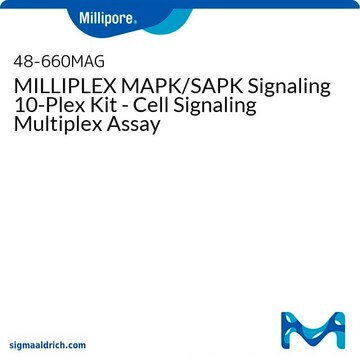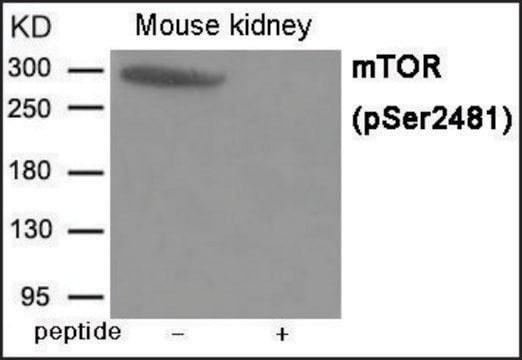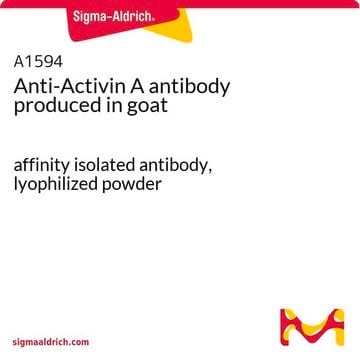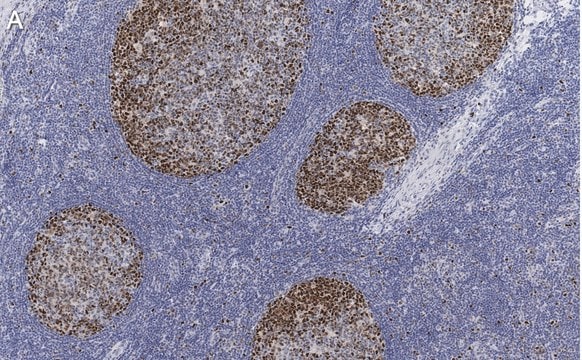17-191
MAP Kinase/Erk Assay Kit, non-radioactive
MAP Kinase/Erk Assay Kit is designed to measure the phosphotransferase activity of MAP (mitogen-activated protein) Kinase in immunoprecipitates & column fractions.
Sign Into View Organizational & Contract Pricing
All Photos(1)
About This Item
UNSPSC Code:
12161503
eCl@ss:
32161000
NACRES:
NA.84
Recommended Products
Quality Level
manufacturer/tradename
Upstate®
technique(s)
activity assay: suitable (kinase)
NCBI accession no.
UniProt accession no.
shipped in
wet ice
Application
MAP Kinase/Erk Assay Kit is designed to measure the phosphotransferase activity of MAP (mitogen-activated protein) Kinase in immunoprecipitates & column fractions.
Used to detect/quantify: MAP Kinase/Erk
Components
Assay Dilution Buffer I (ADBI) (Cat.# 20-108)
MAP Kinase/Erk Substrate Cocktail II (Cat.# 20-166)
Inhibitor Cocktail (Cat.# 20-116)
Magnesium/ATP Cocktail (Cat.# 20-113)
Anti-phospho-MBP, clone P12 (Cat.# 05-429)
MAP Kinase/Erk Substrate Cocktail II (Cat.# 20-166)
Inhibitor Cocktail (Cat.# 20-116)
Magnesium/ATP Cocktail (Cat.# 20-113)
Anti-phospho-MBP, clone P12 (Cat.# 05-429)
Quality
The assay kit is designed to measure the phosphotransferase activity of MAP (mitogen-activated protein) Kinase in immunoprecipitates and column fractions. The assay kit is based on phosphorylation of a specific substrate (myelin basic protein, MBP). The phosphorylated substrate is then analyzed by immunoblot analysis, probing with a monoclonal Phospho-specific MBP antibody.
Other Notes
This product is derived from bovine source. Export of this product to certain countries may be restricted. Please contact Customer Service or your local distributor to inquire about product availability and export options.
Legal Information
UPSTATE is a registered trademark of Merck KGaA, Darmstadt, Germany
Disclaimer
Unless otherwise stated in our catalog or other company documentation accompanying the product(s), our products are intended for research use only and are not to be used for any other purpose, which includes but is not limited to, unauthorized commercial uses, in vitro diagnostic uses, ex vivo or in vivo therapeutic uses or any type of consumption or application to humans or animals.
Storage Class Code
12 - Non Combustible Liquids
Flash Point(F)
Not applicable
Flash Point(C)
Not applicable
Certificates of Analysis (COA)
Search for Certificates of Analysis (COA) by entering the products Lot/Batch Number. Lot and Batch Numbers can be found on a product’s label following the words ‘Lot’ or ‘Batch’.
Already Own This Product?
Find documentation for the products that you have recently purchased in the Document Library.
A Karcher et al.
Electrophoresis, 18(7), 1173-1179 (1997-06-01)
Some representative standard pyrethroid insecticides, namely permethrin, phenotrin, cypermethrin, sanmarton and fenpropathrin, were subjected to base hydrolysis with the aim of facilitating the indirect determination of these neutral species of low water solubilities by aqueous capillary electrophoresis. This first involved
B M van den Berg
Electrophoresis, 11(10), 824-829 (1990-10-01)
To test seed lots of tomato F1 hybrid varieties for the presence of undesirable inbred seeds by electrophoresis, a method has been developed on the basis of ultrathin-layer isoelectric focusing. The method is based on the genetic variation of the
J Van Damme et al.
European journal of immunology, 20(9), 2113-2118 (1990-09-01)
Isolation of the human neutrophil activating protein (NAP) interleukin 8 (IL8) from leukocytes has revealed that it is structurally related to beta-thromboglobulin (beta TG) from platelets. Both these proteins occur as natural mixtures of multiple forms, differing from each other
Ignazia Tusa et al.
Oncogene, 37(19), 2601-2614 (2018-02-28)
Malignant melanoma is among the most aggressive cancers and its incidence is increasing worldwide. Targeted therapies and immunotherapy have improved the survival of patients with metastatic melanoma in the last few years; however, available treatments are still unsatisfactory. While the
M B Parr et al.
Biology of reproduction, 44(3), 491-498 (1991-03-01)
Immunization in the vagina can lead to the production of specific antibodies in the luminal fluid of this organ. To help understand the immune mechanisms involved in this process, we have studied the occurrence of Langerhans cells (LCs), macrophages, natural
Our team of scientists has experience in all areas of research including Life Science, Material Science, Chemical Synthesis, Chromatography, Analytical and many others.
Contact Technical Service








